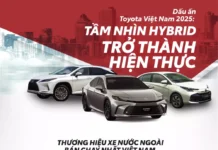
|
Chinese automotive brands have historically struggled with a reputation for “unreliability” in the Vietnamese market, with some entering and exiting quietly. In this “comeback,” several Chinese car brands are implementing strategies to rebuild consumer trust and demonstrate their commitment to the long-term market.
Establishing Local Manufacturing Plants
Several Chinese brands have proactively formed joint ventures with Vietnamese corporations to establish local manufacturing facilities and product research offices. In September 2024, Tasco announced a joint venture with Geely Auto, a subsidiary of Geely Holding Group, to construct a plant in Tien Hai, Thai Binh. The plant, covering an area of approximately 30 hectares, is expected to commence operations in 2026, with an annual production capacity of 75,000 vehicles. The models manufactured at this facility will bear the Lynk & Co and Geely brands, serving both domestic customers and those in Southeast Asian export markets.
|
|
|
Tasco-Geely factory in Thai Binh province. Image source: Tasco. |
In addition to the Geely-Tasco venture, the Chery-Geleximco joint venture is also constructing an automobile manufacturing plant, which began in April 2024. This factory, with an initial capacity of 50,000 vehicles per year, is located in Thai Binh. Chery has designated Vietnam as the primary manufacturing hub for its Southeast Asian operations. The plant is scheduled to commence operations in early 2026, focusing on producing hybrid and plug-in hybrid electric vehicles (PHEV) under the Omoda and Jaecoo brands. The total investment in this factory amounts to $800 million, equivalent to more than VND 19,100 billion.
In September 2024, Great Wall Motors (GWM) signed a cooperation agreement with Thanh An JSC to produce GWM-branded vehicles, including Tank and Haval, for the Vietnamese market. At that time, GWM shared with Chinese media that the project to produce GWM-branded vehicles in Vietnam was expected to commence by the end of 2025. However, no further information about this project has been released since then.
|
|
|
Haval Jolion. Image source: GWM. |
Prior to this, there were reports of BYD seeking partners to build a local manufacturing plant in Vietnam. However, the electric vehicle manufacturer appears to have shifted its strategy and temporarily halted the project. Currently, BYD vehicles distributed in Vietnam are directly imported from China, but they may transition to imports from Thailand once BYD’s manufacturing plant in that country becomes operational.
Expanding Dealer Networks and Offering Decade-Long Warranties
To quickly establish a presence and “introduce” themselves to Vietnamese consumers, some Chinese car brands have rapidly expanded their dealer networks across various provinces at a remarkable pace. MG, a Chinese brand with a long-standing presence in Vietnam, boasts approximately 40 dealerships nationwide, making it the Chinese brand with the most extensive dealer network currently.
Geely, which officially entered the Vietnamese market in March 2025 through the Geely-Tasco joint venture, leveraged the support of the Tasco corporation to immediately introduce a network of 15 dealerships and 15 experience stores nationwide. Geely plans to expand this network to 50 dealerships by the end of 2025.
|
|
|
Lynk & Co dealership in Ho Chi Minh City. Image source: Phuong Lam. |
In addition to Geely, Tasco also distributes electric vehicles under the Lynk & Co brand through a network of 11 dealerships across the country.
BYD, upon its entry into Vietnam, aimed to have 100 dealerships by 2026. According to its official website, the Chinese brand currently has 26 dealerships in various provinces and cities nationwide.
The Chery-Geleximco joint venture currently has 12 dealerships distributing Omoda Jaecoo vehicles in Vietnam, and they aim to increase this number to 30 dealerships by the end of the year.
|
|
|
Jaecoo J7. |
When launching their first model, the Omoda C5, Chery introduced an impressive warranty policy, including a 7-year or 1-million-kilometer warranty on the powertrain and a 10-year or 1-million-kilometer warranty on the engine, whichever comes first.
Overall, Chinese automotive brands are attempting to get “closer” to Vietnamese consumers through extensive dealer networks and attractive after-sales programs. However, winning the trust of Vietnamese consumers remains a long journey, where product quality and brand reputation will be the ultimate deciding factors.
Suggested Reading for Your Journey
Our Automotive section offers a diverse range of engaging book titles to accompany you on your travels. During those moments of rest and relaxation, a good book can be an enjoyable companion.
Tesla Surprises with Price Increase for Electric SUV Model Y, What’s Going On?
Tesla has previously resorted to reducing prices for its electric car models in the Chinese market in order to boost its declining sales, which have been significantly affected by the introduction of diverse and competitively priced products by its competitors. Therefore, the recent price increase for the Model Y by the American automaker has attracted attention.








































